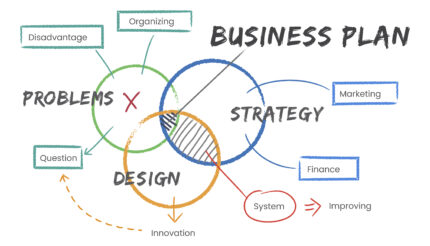How Numbers Run Your Business and Knowing Them Gives You Control
In today’s fast-paced business world, success is not just about having a great idea or offering a unique product. The intricacies of running a thriving business venture, boil down to a game of numbers. For entrepreneurs and business leaders, understanding these numbers is not just an added advantage; it’s a necessity. Let’s outline how numbers run your business and why knowing them helps you steer your ship and how not knowing them, can sink it.
-
Financial Indicators and Profitability
The most straightforward way numbers run your business is through financial statements. Profit & Loss statements, Balance Sheets, and Cash Flow statements, give a clear picture of your company’s financial health. Understanding these statements helps you to:
- Identify Profit Centers: Knowing which products or services are most profitable allows you to focus more resources there.
- Manage Expenses: Recognising unnecessary expenses can be the difference between profit and loss.
- Plan for the Future: Accurate financial forecasting enables you to plan for growth or contraction.
-
Operational Efficiency
Every operation in your business can be quantified, be it production rates, delivery times, or customer service response times. By measuring these processes:
- You can identify bottlenecks, when you understand that numbers run your business.
- Improve efficiency.
- Ensure that resources (both human and material) are used effectively.
-
Marketing Metrics and Customer Behaviour
In the age of digital marketing, metrics like click-through rates, conversion rates, and bounce rates are paramount. Analysing these numbers gives you more control.
- Refine marketing strategies.
- Understand customer preferences.
- Allocate marketing budget more efficiently.
-
Employee Performance and Productivity
Numbers play a crucial role in your HR management. By quantifying performance metrics, you can:
- Recognise and reward high-performing employees.
- Identify areas of training and improvement.
- Make informed hiring and firing decisions.
-
Strategic Decision Making
Numbers inform you about market trends, competition, and internal business health. Making decisions based on data:
- Reduces risks.
- Offers clearer insights into the potential outcomes.
- Enables a you to adapt quickly to changing environments.
Why Knowing Your Numbers Gives You Control
- Informed Decisions: Making decisions based on accurate data reduces your risk of costly mistakes.
- Predict Future Trends: Historical data allows you to forecast future trends and adapt accordingly.
- Resource Allocation: Knowing where the business stands enables you to allocate resources (time, money, and personnel) effectively.
- Empowerment: Numbers can validate your business decisions, providing a sense of confidence and direction.
- Transparency: Sharing key performance indicators (KPIs) with stakeholders, employees, and even customers can build trust and align everyone with the business’s goals.
The Perils of Ignoring the Numbers Will Result in Business Mistakes You Can’t Afford
-
Financial Mismanagement
Without a clear understanding that numbers run your business and ignoring your financial metrics you may experience:
- Budget Oversights: You could spend more than you earn, leading to debt accumulation.
- Missed Profit Opportunities: Not knowing which products or services yield the most profit might mean missing out on lucrative opportunities.
- Unforeseen Expenses: Unexpected expenses can crop up, shaking the very foundations of your business if not accounted for.
-
Operational Inefficiencies
Ignorance about operational metrics can lead to:
- Bottlenecks: Without clear data, you won’t know where the slowdowns are occurring.
- Wastage: Resources might be squandered, leading to higher costs.
- Reduced Productivity: Without clear KPIs, employee productivity may plummet.
-
Misguided Marketing Efforts
If you’re not tuned into your marketing metrics:
- Poor ROI: Money spent on campaigns might not yield desired results.
- Misunderstood Audiences: Without knowing customer behaviour data, you can’t tailor your campaigns effectively.
- Lost Opportunities: You might miss trending marketing platforms or strategies.
-
Stagnant Growth
Without proper data:
- No Clear Strategy: You might struggle to create a growth strategy without knowing where you currently stand.
- Missing Market Shifts: You may overlook trends and shifts in the market, making your product or service obsolete.
-
Decreased Employee Morale
If employee performance metrics aren’t tracked:
- Lack of Recognition: High performers might feel unappreciated.
- No Growth Path: Without clear KPIs, employees won’t know where they need to improve or grow.
- Decreased Engagement: Teams might feel directionless, leading to decreased motivation and engagement.
-
Inadequate Risk Management
Without numbers to guide you:
- Uninformed Decisions: Choices made on your gut feelings can lead to undesirable outcomes.
- Unprepared for Downturns: Without forecasting, a sudden market downturn could catch your business off guard.
-
Losing Stakeholder Trust
For businesses with stakeholders:
- Reduced Transparency: Stakeholders expect to see numbers that reflect business health.
- Uncertain Future: Without clear metrics, stakeholders might doubt the longevity and sustainability of the business.
Conclusion
Numbers, in the context of business, aren’t just abstract figures on a spreadsheet. They represent the health, efficiency, and potential of a your business. By ignoring these numbers, you not only jeopardise its future but also risks missing the opportunities that data-driven insights can provide.
In the modern business landscape, data is akin to a lighthouse, guiding you through murky waters and helping you navigate challenges. The cost of ignoring this beacon is high. So, whether you’re a business leader, an entrepreneur, or an aspiring manager, ensure that you know your numbers. The success of your venture might just hinge on them.






